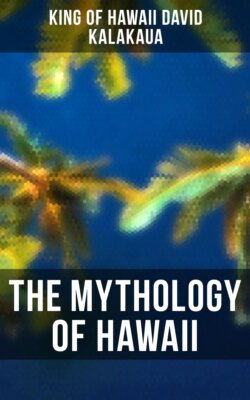Читать книгу The Mythology of Hawaii - King of Hawaii David Kalakaua - Страница 7
На сайте Литреса книга снята с продажи.
THE TABU.
ОглавлениеTable of Contents
Strictly speaking, the ancient tabu, or kapu, was a prerogative adhering exclusively to political and ecclesiastical rank. It was a command either to do or not to do, and the meaning of it was, “Obey or die.” It was common to the Polynesian tribes, and was a protection to the lives, property and dignity of the priesthood and nobility.
The religious tabus were well understood by the people, as were also the personal or perpetual tabus of the ruling families; but the incidental tabus were oppressive, irksome and dangerous to the masses, as they were liable to be thoughtlessly violated, and death was the usual penalty.
Everything pertaining to the priesthood and temples was sacred, or tabu, and pigs designed for sacrifice, and running at large with the temple mark upon them, could not be molested. It was a violation of perpetual tabu to cross the shadow of the king, to stand in his presence without permission, or to approach him except upon the knees. This did not apply to the higher grades of chiefs, who themselves possessed tabu rights.
The Puloulou, or Tabu Mark.
Favorite paths, springs, streams and bathing-places were at intervals tabued to the exclusive use of the kings and temples, and squid, turtle, and two or three species of birds could be eaten only by the priests and tabu nobility.
Yellow was the tabu color of royalty, and red of the priesthood, and mantles of the feathers of the oo and mamo could be worn only by kings and princes. Feather capes of mingled red and yellow distinguished the lesser nobility.
Women were tabued from eating plantains, bananas, and cocoanuts; also the flesh of swine and certain fish, among them the kumu, moano, ulua, honu, ea, hahalua and naia; and men and women were allowed under no circumstances to partake of food together. Hence, when Liholiho, in 1819, openly violated this fundamental tabu by eating with his queen, he defied the gods of his fathers and struck at the very foundation of the religious faith of his people.
The general tabus declared by the supreme chief or king were proclaimed by heralds, while the puloulou—a staff surmounted by a crown of white or black kapa—placed at the entrance of temples, royal residences and the mansions of tabu chiefs, or beside springs, groves, paths, or bathing-places, was a standing notification against trespass. General tabus were declared either to propitiate the gods or in celebration of important events. They were either common or strict, and frequently embraced an entire district and continued from one to ten days.
During the continuance of a common tabu the masses were merely required to abstain from their usual occupations and attend the services at the heiaus, or temples; but during a strict tabu every fire and every light was extinguished, no canoe was shoved from the shore, no bathing was permitted, the pigs and fowls were muzzled or placed under calabashes that they might utter no noise, the people conversed in whispers, and the priests and their assistants were alone allowed to be seen without their places of abode. It was a season of deathly silence, and was thought to be especially grateful to the gods.
Some of the royal tabus, centuries back in the past, were frivolous and despotic, such as regulating the wearing of beards and compelling all sails to be lowered on passing certain coast points; but, however capricious or oppressive, the tabu was seldom violated, and its maintenance was deemed a necessary protection to the governing classes.
